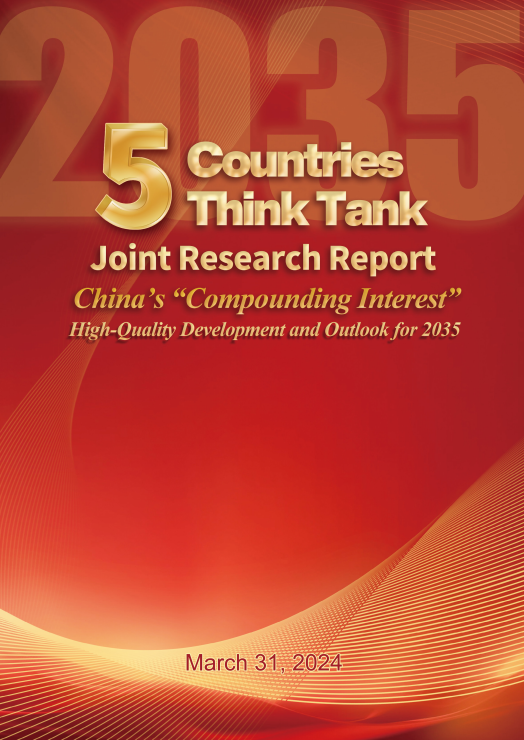Reports
Your Present Location: PUBLICATIONS> ReportsFive Countries Think Tank Joint Research Report on China’s “Compounding Interest”: High-Quality Development and Outlook for 2035

Executive Summary
In recent years, China has achieved a series of remarkable accomplishments in high-quality economic and social development. These achievements are a manifestation of China’s “compounding interest”. Compounding interest is a useful tool for wealth growth, assets preservation, as well as assets appreciation. The continuous accumulation of Chinese modernization can bring the development of “compounding interest” to the country. The compounding interest of China is characterized by stability of returns, long-term accumulation and sustainability. With enormous potential, this development model can sustainably drive the country’s economic growth and promote prosperity in the long term. The momentum of China’s modernization, characterized by the development of “compounding interest”, focuses on taking innovation driven initiatives, deepening reforms, expanding opening-up, and promoting green development.
This report selects five major areas, namely, “new wellbeing”, “new consumption”, “new manufacturing”, “new infrastructure” and “new services”, to showcase the achievements of China’s high-quality development in the past few years, and especially in the last year.
“New wellbeing” features ten major changes: more vibrant rural life, enriched life in small towns, increased urban green spaces, enhanced labor protection, better local healthcare, expedited administrative processes, reduced telecommunication fraud, strengthened anti-corruption measures, resurgence in capital markets and improved resident debt situation.
In terms of “new consumption”, policies have remarkably assumed a more significant role in driving economic growth. The development of cultural tourism across various regions in China has kept pace with market changes and has continued to launch hot new consumption scenes. The entertainment and performance economy has greatly diversified new business forms of urban consumption, while the digital retail market has gradually picked up.
With regard to “new manufacturing”, advanced manufacturing has become the foundation of a strong country. “Lighthouse factories” are leading the transformation and upgrading of traditional industries, with exports of the “new three” 1 breaking the trillion-yuan mark for the first time, accelerating the internationalization of products and the global layout of industrial chains. The wave of independent research and development has accelerated the domestic substitution in the electronics industry, highlighting the role of industries’ interconnection.
The “new infrastructure” has been concentrating efforts in seven major areas: 5G base station construction, ultra-high voltage power transmission, inter-city high-speed rail and urban rail transit, new energy vehicles charging stations, big data centers, artificial intelligence, and industrial internet, have gradually become the new engines for the high-quality development of China’s economy.
“New services” supported by “new quality productive forces” have served as a key driver for high-quality development, characterized by digital, platform-based, intelligent, equalized, high-end and globalized orientation.
The currently “weak social expectations” are essentially “weak expectations of economic compounding interest”.Although there is the combined effect of policy information asymmetry and unfavorable external factors, more attention should be paid to the impact of lagging institutional reforms. Despite the ongoing weak social expectations, China’s economic growth potential remains enormous. As long as we firmly deepen reform and opening up in the lawbased and market-oriented direction, correct distortions in resource allocation and ensure effective implementation of policies, we will be able to reverse the social expectations of economic compounding interest in the medium to long term.
As the economic compounding interest is gradually delivered, more efforts should be made to further bridge the information gap in policy perception and policy implementation. These entail unleashing innovation vitality, breaking through bottlenecks in advanced technology, and prioritizing the development of a service-led, new type of globalization; reforming the income distribution system and implementing the plan of doubling the national income; appropriately increasing the risk appetite and boosting confidence in development by “establishing the new before abolishing the old”; advancing high-quality capital market reforms, building a financially robust country and enabling people to feel more satisfied, happy, and secure.
The foundation for China’s high-quality development is being consolidated, with the policy compounding interest of internal systemic reforms and high-level opening up to the outside world constantly being delivered. In this process, it is crucial to improve development expectations and to rebuild social trust.
Envisioning the future from the perspective of a think tank: China will achieve its long-range objectives for national economic and social development through the year 2035. By 2035, China is expected to be the world’s largest economy with its GDP surpassing the United States. Disposable income is expected to double, and the proportion of middle-income group is expected to increase from one-third to nearly half. Each household will own a car on average, one-third being new energy vehicles. China is to reach peak carbon dioxide emissions ahead of schedule before 2030 and to be the country with the biggest annual emission reductions by 2035. At least over 200 Chinese companies are to be on the Fortune Global 500 list, bringing the global competitiveness of Chinese enterprises to new heights. By 2035, China is to become one of the world’s most mature capital markets and the Belt and Road Initiative will have become the world’s largest cooperation initiative, covering the most countries, population and economic scales.
China needs to rely on the sustained and cumulative compounding interest to achieve its 2035 vision. With the long-term growth potential unleashed by the Chinese path to modernization, China will further pursue the gradual realization of high-quality development, cultivate and develop new quality productive forces, continue to renew policy highlights, and to create the compounding interest, thereby fulfilling its objectives, including surpassing the U.S. in terms of GDP and doubling disposable incomes.























































































 京公网安备 11010802037854号
京公网安备 11010802037854号





